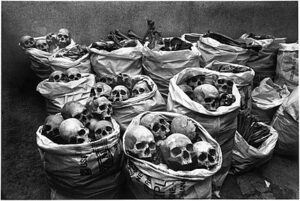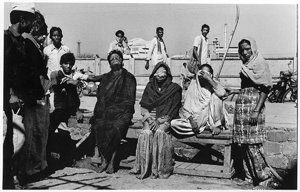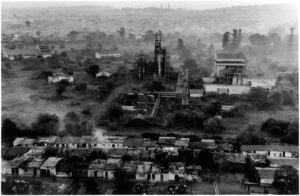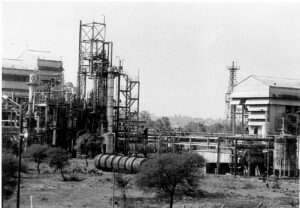It is close to midnight in Spices Square.
The scent of poetry is in the air.
The greats have come to read, the crowd to hear.
The love of crafted words brings union here.
Midnight comes and goes. The ghazals go on.
The square is all attention and applause.
But now a stench comes riding on the breeze
And suddenly all words are stolen, gone
To ground as fingers clutch at throats. Carefree
Times snuffed out by carelessness. Now only
Doom comes rhyming through the square, withering
The word on poisoned lips. Here is thy sting,
O Death, come unseen to scatter poets.
Tonight one word is read on Bhopal’s lips,
The last and worst of words, Apocalypse.
Sew words. Embroider the killing blanket.
In any land of bigmouth Hunger
The Foreign Factory is King.
In Bhopal, long before Carbide came,
They had visitations enough:
Of malnutrition and the diseases of water and insects;
Of politicians infected with corruption;
Of malaria, polio, typhoid and TB;
And so on and on in an endless list as long
As the Calcutta train.
Cancers eating at the heart of India.
Union Carbide was manna from heaven;
The hand of God stretched out to man;
The hair of Siva rivering plenty;
An air-conditioned wind of change;
A breath of work, of hope, of life.
The wages were awesome.
Bhopal was Babel, a babble of tongues;
A cauldron of castes, a bazaar of religions;
A magnet at the hot centre of things;
A lakeside lotus land of poetry, luck and learning;
A poorhouse with its windows opening up to yearning.

While digging the foundation
Some human skulls were found
And the Indian masons said
The skulls were omens
And the omens were not good.
Still, for long, only little things went wrong.
A man died, but only one.
(Mohammed Ashraf was his name.)
Small warnings blended with the landscape,
Like a volcano venting steam.
Production plummeted. Workers were let go.
Those remaining took things easy.
Costs were cut, safety systems turned off.
Unused methyl isocyanate stayed stored in tanks.
It happened on a Sunday night.
I remember there was a poetry reading in Spices Square.
A commentator adds
Mainly the poor died.
This was death on a galloping industrial scale
The horseman riding on the breeze
The deadly tanked liquid exploding into gas
The cloud of many vapours spreading
Special effects for every taste
Choking vomiting and coughing blood blinding
Rigor mortised faces going green
Rushing waves of frightened people running
Mown down in spasms and convulsions
Frothing at the mouth.
The countless gods looked on,
Useless or malign.
By Monday afternoon the poison clouds
Had been replaced by clouds of smoke,
The stench of gas by that of burning flesh
As the Hindu dead were burned.
Afterwards
The survivors watched the skies with nervous eyes
And sure enough the lawyers came in planes,
Circling like vultures.
Kieran Furey
About Kieran Furey:
Kieran first published ‘BHOPAL, 1984’ in Irish poetry magazine The Shop in 2004, having been inspired to write it after his experiences travelling around India with a rucksack for six months. We wish to thank him for sharing this incredibly moving piece with us again following the 35th anniversary of the disaster.
An award winning poet, Kieran Furey was born in 1953 in Curraghroe, Co Roscommon, Ireland. He was educated in Curraghroe NS; Summerhill College, Sligo; NUI Galway; Universidad Andina Simon Bolivar (Quito, Ecuador) and Mater Dei Institute of Education, Dublin, where he graduated with distinction from Mater Dei’s MA in Poetry Studies.
Furey has been to about fifty countries, and has worked on four continents. He presently lives in Dublin.
Kieran Furey has written nearly 2,000 poems, of which he has self-published 330. Over a hundred have appeared in journals, poetry magazines and newspapers, mainly in Ireland.
Kieran Furey’s most recent collections are Linnane in London, Tales from Roscommon and The History House.




